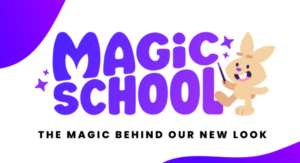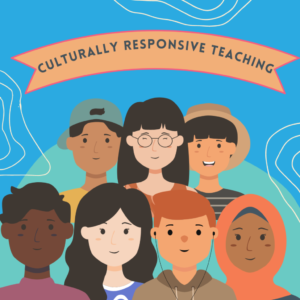Trying Out Magic School AI
As part of my commitment to exploring innovative educational tools, I recently tried out MagicSchool AI, a platform specifically designed to support teachers through the power of artificial intelligence. Unlike general-purpose AI tools, MagicSchool AI is tailored for classroom use, offering time-saving solutions and personalized learning support.
This post reflects on my experience using MagicSchool AI and how I believe it can be a game-changer—for teachers, for students, and for the future of education.

What Is MagicSchool AI?
MagicSchool AI is an education-focused AI platform that offers more than 60 tools designed to support teachers in their day-to-day work. It uses large language models (similar to ChatGPT) to generate lesson plans, create accommodations for IEPs and multilingual learners, write rubrics, suggest parent communication templates, and more—all within minutes.
It’s like having a co-teacher that handles the prep, freeing up time for what really matters: connecting with students and teaching.
How It Enhances Teaching and Learning
MagicSchool AI streamlines the behind-the-scenes work that often takes up hours of a teacher’s day. Here’s how it helps:
1. Lesson Planning and Differentiation
-
I tested its lesson plan generator, and within seconds, it created a full plan for a 9th-grade linear equations lesson, complete with objectives, activities, and assessment ideas.
-
It even offered differentiation strategies for English language learners and students with special needs—something that normally takes careful planning.
2. Assessment Tools
-
MagicSchool can generate formative and summative assessment questions aligned to specific standards.
-
It can also help write rubrics, tailor feedback, and design exit tickets to quickly check for understanding.
3. Administrative Support
-
Need to send a note home to parents or write a classroom newsletter? MagicSchool AI can generate templates that are kind, clear, and customizable.
-
It can also help craft IEP accommodations and modification suggestions, helping educators meet legal and instructional responsibilities efficiently.
All of this makes it a tool that respects teachers’ time—something we all need more of.
Supporting Student Learning and Engagement
While MagicSchool is primarily teacher-facing, its impact is deeply felt in the student experience:
-
Teachers who spend less time on admin have more energy to support individual students.
-
Its tools help create more inclusive, differentiated lessons, meeting diverse learners where they are.
-
With support from AI, teachers can experiment with creative and student-centered instruction, instead of relying on one-size-fits-all approaches.
For example, it can suggest open-ended, inquiry-based questions to encourage student-led learning and deeper thinking.
Encouraging Critical Thinking and Professional Growth
Using MagicSchool AI has also helped me reflect on my own teaching practices:

-
I found myself rethinking how I give feedback—AI can model how to be concise, specific, and growth-oriented.
-
It pushed me to think more intentionally about culturally responsive teaching and universal design for learning because it offers options across learner needs.
-
The AI isn’t perfect—it makes suggestions that sometimes need adjusting—but that in itself promotes professional reflection and choice.
In short, it acts more like a thinking partner than a machine doing all the work.
Ethical and Practical Considerations
As powerful as MagicSchool AI is, we need to approach it thoughtfully:
1. Bias and Accuracy
-
Like all AI tools, it’s trained on vast amounts of data that may include bias. Teachers must use judgment to refine and adapt what it generates.
2. Over-Reliance
-
It’s tempting to automate everything, but teaching is personal. The real impact of MagicSchool AI comes from how teachers use it to enhance—not replace—their voice and vision.
3. Student Data and Privacy
-
Thankfully, MagicSchool AI is FERPA and COPPA compliant, and doesn’t require student information to function, which helps ease privacy concerns.
My Perspective on AI in Education
My experience with MagicSchool AI has made me feel optimistic. This tool doesn’t try to replace educators—it respects them. It gives us time, energy, and creativity back. It’s a way to help teachers meet the growing demands of the profession without burning out.
AI in education should be built on a foundation of human judgment, empathy, and collaboration. MagicSchool AI feels like a step in that direction.
Looking Ahead: The Future of AI-Enhanced Teaching
I believe tools like MagicSchool AI are only the beginning. In the near future, I imagine:
-
AI co-planning and co-reflecting with teachers in real time.
-
Personalized professional development powered by AI insights.
-
Student-facing tools that allow learners to ask questions, receive feedback, and revise work with guidance tailored to their needs.
But no matter how smart AI becomes, it will always be the human teacher who gives learning meaning and purpose. Our role is to use these tools intentionally—to support all learners, foster equity, and spark curiosity.
Final Thoughts
Trying out MagicSchool AI has given me a new perspective on what’s possible in education. It’s not about replacing educators—it’s about empowering them. I see this tool as a partner in my practice: helping me save time, personalize instruction, and support my students more thoughtfully.
If you’re a teacher curious about AI, I highly recommend giving MagicSchool AI a try. It’s practical, grounded in classroom realities, and full of possibilities.
Have you explored an AI tool that shifted your thinking about teaching? Let’s keep the conversation going!